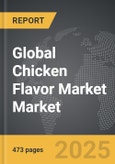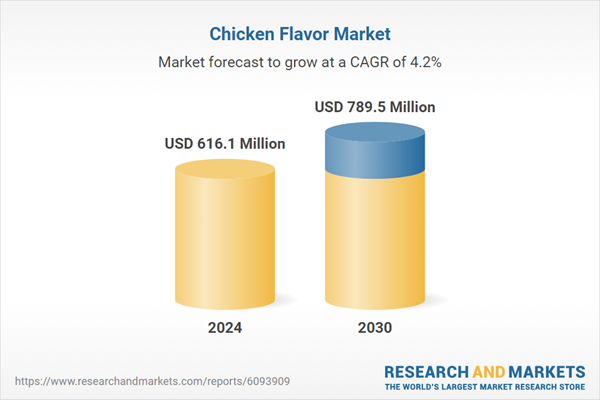Global Chicken Flavor Market - Key Trends & Drivers Summarized
Why Is Chicken Flavor Becoming a Staple Ingredient Across Processed Foods, Plant-Based Alternatives, and Culinary Innovation?
Chicken flavor is gaining widespread importance as a foundational taste enhancer used in diverse food applications, including instant noodles, soups, snacks, seasonings, ready meals, sauces, and emerging plant-based products. Its broad sensory appeal, versatility, and familiarity make it a go-to profile for both traditional and reformulated food products aiming to deliver savory depth and consumer comfort. As consumer preferences shift toward convenience, umami-rich foods, and clean-label formulations, demand for high-impact, authentic chicken flavor solutions is expanding across global food manufacturing and foodservice sectors.In addition to conventional meat-based formulations, demand is growing for yeast-extract-based, enzymatically hydrolyzed, and fermentation-derived chicken flavors that cater to vegetarian, vegan, and flexitarian diets. These ingredients are enabling producers to replicate the taste of chicken without using animal-derived materials, aligning with health, sustainability, and ethical consumption trends. The cross-application utility of chicken flavor - from low-sodium broths to protein snacks and culinary seasoning blends - continues to drive its strategic importance in food innovation pipelines.
How Are Ingredient Technologies, Flavor Delivery Systems, and Regulatory Preferences Driving Innovation in Chicken Flavor Development?
Ongoing advancements in flavor chemistry and ingredient processing are enhancing the intensity, stability, and naturalness of chicken flavor compounds. Techniques such as Maillard reaction flavor synthesis, spray drying, and encapsulation are improving aroma retention, solubility, and resistance to high-heat or freeze-thaw cycles - making chicken flavor suitable for a wide variety of processed food matrices. Liquid, powder, paste, and oil-soluble forms are being developed to suit specific application needs, from shelf-stable dry goods to refrigerated ready meals.Clean-label demands are pushing reformulation toward natural origin claims, allergen-free ingredients, and minimal additive use. Label-friendly chicken flavor solutions using vegetable-based precursors, non-GMO fermentation substrates, or organic-compliant inputs are gaining traction. Additionally, flavor masking and modulation technologies are being integrated to offset off-notes in plant-based proteins or low-sodium formulations, ensuring that chicken flavor continues to deliver a consistent and appealing sensory experience.
As global regulatory frameworks tighten around flavor labeling, allergen declarations, and origin traceability, manufacturers are investing in compliant, transparent flavor systems that meet regional expectations while supporting global scalability.
Which Application Categories and Regional Markets Are Accelerating Demand for Chicken Flavor Solutions?
Key application categories include convenience foods (instant soups, noodles, and rice dishes), savory snacks, bouillons, broths, gravies, frozen ready meals, and pet foods. The rise of plant-based meat analogs, high-protein snacks, and global fusion cuisine is further expanding the application scope for authentic chicken-like flavor profiles across both animal- and non-animal-based product lines.Asia-Pacific leads global demand, particularly in countries with high per capita consumption of chicken-flavored convenience foods, such as China, India, Japan, and South Korea. North America and Europe represent mature but growing markets, with increased demand for clean-label, low-sodium, and plant-based flavor alternatives. Latin America and the Middle East are emerging as growth regions due to expanding urbanization, growing food processing sectors, and rising consumer interest in convenient, flavorful meal solutions.
Food manufacturers, QSR chains, and private label brands across these regions are investing in customized flavor systems to localize product offerings while maintaining consistency and cost-effectiveness across global supply chains.
What Are the Factors Driving Growth in the Chicken Flavor Market?
The chicken flavor market is expanding in response to evolving consumer preferences for familiar, savory tastes delivered in convenient, affordable, and increasingly health-conscious formats. Its broad appeal across cultural and dietary preferences, combined with its ability to deliver depth in both traditional and meat-alternative dishes, is cementing its role as a high-demand functional ingredient.Key growth drivers include the proliferation of processed and convenience food consumption, rising demand for authentic and umami-rich profiles, expansion of vegetarian and flexitarian product lines, and advances in natural flavor development and delivery. Clean-label trends and regulatory clarity are further reinforcing demand for flavor systems that balance sensory performance with health and transparency.
As culinary experiences, sustainability considerations, and dietary shifts converge, could chicken flavor emerge as a universal building block for the next generation of versatile, culturally adaptable food innovations?
Report Scope
The report analyzes the Chicken Flavor market, presented in terms of market value (US$). The analysis covers the key segments and geographic regions outlined below:- Segments: Form (Liquid, Powder); Nature Type (Organic, Conventional); Application (Soups & Sauces, Food & Beverages, Animal Feed, Bakery Products, Confectionery Products, Other Applications); End-Use (Business-To-Business, Business-To-Consumer).
- Geographic Regions/Countries: World; United States; Canada; Japan; China; Europe (France; Germany; Italy; United Kingdom; Spain; Russia; and Rest of Europe); Asia-Pacific (Australia; India; South Korea; and Rest of Asia-Pacific); Latin America (Argentina; Brazil; Mexico; and Rest of Latin America); Middle East (Iran; Israel; Saudi Arabia; United Arab Emirates; and Rest of Middle East); and Africa.
Key Insights:
- Market Growth: Understand the significant growth trajectory of the Liquid Form segment, which is expected to reach US$573.9 Million by 2030 with a CAGR of a 4.8%. The Powder Form segment is also set to grow at 2.7% CAGR over the analysis period.
- Regional Analysis: Gain insights into the U.S. market, valued at $167.9 Million in 2024, and China, forecasted to grow at an impressive 7.8% CAGR to reach $162.8 Million by 2030. Discover growth trends in other key regions, including Japan, Canada, Germany, and the Asia-Pacific.
Why You Should Buy This Report:
- Detailed Market Analysis: Access a thorough analysis of the Global Chicken Flavor Market, covering all major geographic regions and market segments.
- Competitive Insights: Get an overview of the competitive landscape, including the market presence of major players across different geographies.
- Future Trends and Drivers: Understand the key trends and drivers shaping the future of the Global Chicken Flavor Market.
- Actionable Insights: Benefit from actionable insights that can help you identify new revenue opportunities and make strategic business decisions.
Key Questions Answered:
- How is the Global Chicken Flavor Market expected to evolve by 2030?
- What are the main drivers and restraints affecting the market?
- Which market segments will grow the most over the forecast period?
- How will market shares for different regions and segments change by 2030?
- Who are the leading players in the market, and what are their prospects?
Report Features:
- Comprehensive Market Data: Independent analysis of annual sales and market forecasts in US$ Million from 2024 to 2030.
- In-Depth Regional Analysis: Detailed insights into key markets, including the U.S., China, Japan, Canada, Europe, Asia-Pacific, Latin America, Middle East, and Africa.
- Company Profiles: Coverage of players such as Akari Therapeutics, Alexion Pharmaceuticals Inc., Alnylam Pharmaceuticals, Inc., Amgen Inc., Apellis Pharmaceuticals and more.
- Complimentary Updates: Receive free report updates for one year to keep you informed of the latest market developments.
Some of the 44 companies featured in this Chicken Flavor market report include:
- ACH Food Companies Inc.
- Ajinomoto Co., Inc.
- BASF SE
- Cargill, Incorporated
- Carnad
- Givaudan
- Hormel Foods Corporation
- Innova Flavors
- International Flavors & Fragrances Inc. (IFF)
- Kerry Group plc
- Kent Precision Foods Group, Inc.
- Koninklijke DSM N.V.
- Mane SA
- Nestlé S.A.
- Sensient Technologies Corporation
- Symrise AG
- Takasago International Corporation
- The J.M. Smucker Company
- The Kraft Heinz Company
- Unilever plc
This edition integrates the latest global trade and economic shifts into comprehensive market analysis. Key updates include:
- Tariff and Trade Impact: Insights into global tariff negotiations across 180+ countries, with analysis of supply chain turbulence, sourcing disruptions, and geographic realignment. Special focus on 2025 as a pivotal year for trade tensions, including updated perspectives on the Trump-era tariffs.
- Adjusted Forecasts and Analytics: Revised global and regional market forecasts through 2030, incorporating tariff effects, economic uncertainty, and structural changes in globalization. Includes historical analysis from 2015 to 2023.
- Strategic Market Dynamics: Evaluation of revised market prospects, regional outlooks, and key economic indicators such as population and urbanization trends.
- Innovation & Technology Trends: Latest developments in product and process innovation, emerging technologies, and key industry drivers shaping the competitive landscape.
- Competitive Intelligence: Updated global market share estimates for 2025, competitive positioning of major players (Strong/Active/Niche/Trivial), and refined focus on leading global brands and core players.
- Expert Insight & Commentary: Strategic analysis from economists, trade experts, and domain specialists to contextualize market shifts and identify emerging opportunities.
Table of Contents
Companies Mentioned (Partial List)
A selection of companies mentioned in this report includes, but is not limited to:
- ACH Food Companies Inc.
- Ajinomoto Co., Inc.
- BASF SE
- Cargill, Incorporated
- Carnad
- Givaudan
- Hormel Foods Corporation
- Innova Flavors
- International Flavors & Fragrances Inc. (IFF)
- Kerry Group plc
- Kent Precision Foods Group, Inc.
- Koninklijke DSM N.V.
- Mane SA
- Nestlé S.A.
- Sensient Technologies Corporation
- Symrise AG
- Takasago International Corporation
- The J.M. Smucker Company
- The Kraft Heinz Company
- Unilever plc
Table Information
| Report Attribute | Details |
|---|---|
| No. of Pages | 473 |
| Published | February 2026 |
| Forecast Period | 2024 - 2030 |
| Estimated Market Value ( USD | $ 616.1 Million |
| Forecasted Market Value ( USD | $ 789.5 Million |
| Compound Annual Growth Rate | 4.2% |
| Regions Covered | Global |









